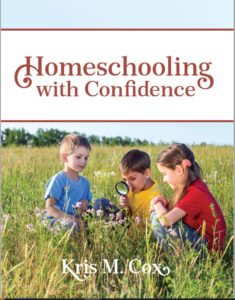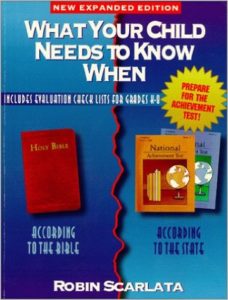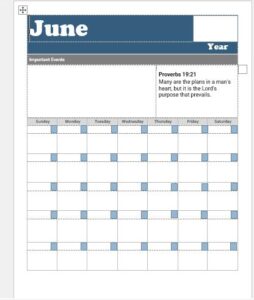 As I talk with homeschoolers, one of the most frequent questions or concerns that I hear is “I don’t know if I’m doing enough?” or “What if I’m doing something wrong or not teaching them enough?”
As I talk with homeschoolers, one of the most frequent questions or concerns that I hear is “I don’t know if I’m doing enough?” or “What if I’m doing something wrong or not teaching them enough?”
Even though most parents are going above and beyond what they need to do in teaching their children, there’s still this underlying fear that they aren’t doing enough, that somehow their children won’t measure up to other children their age.
“What if we miss teaching them something really important?”
“What if they don’t do well on their annual achievement test?”
“I’m afraid I can’t do this teaching thing, as well as the public or private schools, do.”
Can you relate to this?
I know I can. Frankly, many homeschoolers struggle with these fears.
We start comparing ourselves to some of our more successful homeschooling friends. Or we even compare our children to children in public school and wonder if our children are missing out on some great educational experience.
We see that the Johnson children are well above average in their math skills, or the Jones children are so well-mannered, just like little adults. How do they do that? And why aren’t our children like this? The comparison cycle begins, and it can really bring us down.
How do we deal with these nagging feelings of insecurity and doubt with homeschooling? The fears that we aren’t doing enough?
How do we stop that irritating comparison game that we all play?
How can we homeschool with confidence and stop feeling inadequate?
Six tips to help you homeschool with confidence:
Pray for wisdom, seek God’s guidance, and trust God to direct your decisions.
This may sound cliché, but ultimately this is the first and most important weapon we have against the fear and doubt that so often plagues us. God promises us that He will give us wisdom when we ask and that He’ll guide us when we seek Him for direction, so we can rest in that promise. If we seek Him, we can trust that what He leads us to do will be enough! Spend time each day seeking God and His direction for your day and your teaching, He is faithful to help you!
Focus on discipleship and building godly character first!
Major on the majors! Helping our children come to know and love the Lord is truly the most important thing we can do as parents. Once they know the Lord, He’ll be working on them, helping them to want to do their best in all they do, including their school work. Praying for and helping your children develop godly character can be one of the most effective ways to have a successful homeschool. Focusing not only on their character but also helping them to have a godly heart attitude in which they strive to be obedient out of love for you and the Lord is key. As your children grow in their faith, God is at work, helping them to be all they can be.
Deuteronomy 6:6-7: And these words that I command you today shall be on your heart. You shall teach them diligently to your children and shall talk of them when you sit in your house, and when you walk by the way, and when you lie down, and when you rise.
Inga Cannon states:
“When exploring God’s requirements for what our young people learn, it is important to establish a Scriptural definition of knowledge. II Peter 1:5–8 provides a clear description for an educational sequence which will honor God:
‘For this very reason, make every effort to supplement your faith with virtue, and virtue with knowledge, and knowledge with self-control, and self-control with steadfastness, and steadfastness with godliness, and godliness with brotherly affection, and brotherly affection with love. For if these qualities are yours and are increasing, they keep you from being ineffective or unfruitful in the knowledge of our Lord Jesus Christ.’ ESV
Knowledge, then, is explored information within the boundaries of faith and character development.”
(see my posts on Building Godly Character)
Remember that children don’t mature and learn at the same rate, so if your child isn’t up to “speed” so to speak, it may be due to maturity, not a learning disability.
It’s normal for children to develop at different rates physically. One child might learn to walk at age 9 months while another doesn’t walk until they’re 14 months. This goes on all through the developmental years, with children learning different large motor skills at different rates, learning to talk at different ages, reaching puberty at different ages, etc. Just as children develop at different rates, they also learn at different rates. One child may be ready to read at age 4, while another doesn’t learn to read until they’re 10! Just because they’ve turned 5 doesn’t mean that they’re ready or mature enough to learn to read and do math. According to Dr. Raymond Moore in his book, Better Late than Early, some children are not ready for formal learning until ages 8-10!
 Yet our society pushes us to begin teaching children formally at age 5, and many children just aren’t ready. One of our boys struggled to learn to read, we started teaching phonics at age 4, and it wasn’t until he was 9 that the phonetic concepts finally clicked, and he started to read fluently. The amazing thing was that his reading skills were up to his grade level very quickly once he finally “got it”!
Yet our society pushes us to begin teaching children formally at age 5, and many children just aren’t ready. One of our boys struggled to learn to read, we started teaching phonics at age 4, and it wasn’t until he was 9 that the phonetic concepts finally clicked, and he started to read fluently. The amazing thing was that his reading skills were up to his grade level very quickly once he finally “got it”!So remember that it’s okay for kids to learn at different rates, there’s no need to become concerned unless you’re seeing signs of a learning disability. Click HERE to see a list of learning disability signs from the US Dept. of Health and Human Services. A great resource if you suspect a learning disability is diannecraft.org.
4. Guard against falling into the comparison game.
Allowing yourself to fall into the comparison game is a sure-fire way to lose confidence in your homeschooling abilities. I’ve seen it happen so often, a young homeschool mom notices that one of her homeschool friends seems to do such fun, creative things to teach her children and she feels inadequate. I struggled with this way too often in my homeschooling years.
The thing is, you can’t be perfect in all areas, and so you’re almost always going to find someone who does something better than you do. Comparing yourself to others isn’t helpful.
It’s difficult to completely break the comparison habit, but with God’s help, it’s possible to do it less by remembering that it’s okay to be unique! I want to encourage you to focus on following God’s lead rather than trying to please people.
God chose YOU to raise your children because He knew that with His help, you were the best choice as mom or dad for those children! And you will do things differently than another family might, and that’s OKAY! Be free to live life as God leads you to live it and to educate your children as God leads you to do so.
Pray daily for help to stop comparing yourself to others. Seek the Lord for direction each day and trust Him to guide you. It’s okay to seek advice from others you respect but try not to compare yourself and your homeschool to others.
When you start to feel bad about how you’re doing, ask yourself, “Is this from God or is it because I’m comparing myself again?”
Utilize resources and do your best academically.
There are SO many curriculum options out there to help you teach your children! It can be a bit overwhelming, but options can be a blessing because you can customize your curriculum to fit your needs. Check out cathyduffyreviews.com to get some insights into the various options for curriculum on each subject. I also love to consult with families, helping them find the right fit for curriculum based on their needs as a family and their children’s learning styles. Learn more about a consultation HERE.
Once you have curricula or teaching resources to help you, then you just need to do your best to teach your children, trusting God for guidance on a daily basis. Follow the teacher’s guides, follow the Holy Spirit’s leading and RELAX! Most homeschool children score between the 65th to the 85th percentile on the annual academic achievement tests. Go to the National Home Education Research Institute’s webpage to learn more about how homeschoolers are doing.
If you’re concerned about where your child is at academically, here are a couple of resources you can use to verify that you’re on track. (But remember that kids mature at different rates though, so don’t fret if your child isn’t quite up to their grade level – just set some goals to work towards getting them there!).
What Your Child Needs to Know When by Robin Sampson
World Book also has a free “Typical Course of Study” Guide available.
Use the Homeschooling with Confidence guidebook to make sure you’re doing all that you need to . . . and enjoy the journey!
Homeschooling with Confidence is a guidebook for homeschoolers who want a bit of accountability and encouragement! Topics include starting off right, planning & scheduling, learning styles, managing your home while homeschooling, avoiding resistance, developing a love or learning, choosing curriculum, discipleship & character training, and wrapping up your school year well.
You can find this book in my “store” link or click on the title above.
Homeschoolers encouraging other homeschoolers is the best way to help you find confidence in your homeschool journey! I’d love to hear your thoughts…please share with others below about how you find confidence as you homeschool!










Thanks for this today Kris! Miss you!
Katie, we miss you too! I’d love to see you if you come up this way sometime!
Having home educated for more than 25 years now, I can truly say I wish I had had Kris’ Homeschooling with Confidence early on in our homeschooling journey!! She takes you thoroughly through your school year, whether you’re just beginning or are down the road a ways and need some help and encouragement. Each chapter has questions and/or worksheets to help you think through and apply the material to your own unique home school. It’s a wonderful tool to help you focus on God and bring glory to Him in your journey!
Thank you, Kris! I appreciate your kind words about the Homeschooling with Confidence guidebook! I pray God can use it to bless many homeschool families!